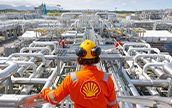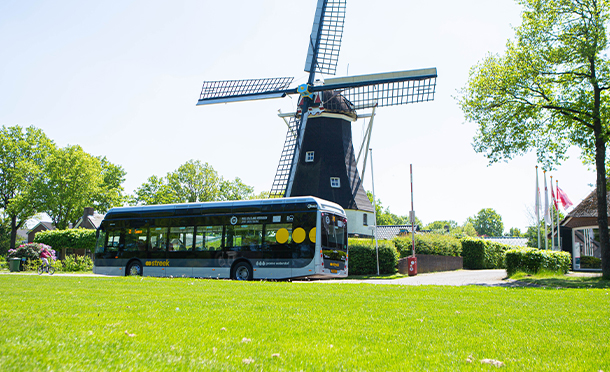Changing demand across sectors
A critical part of our success in the energy transition will be our ability to work sector by sector with customers and stakeholders. By listening to our customers, learning from them and working with them, we can understand what they value and need as the world moves towards a lower-carbon future. We aim to use such insights to profitably provide the low-carbon products and services they will want to buy.
We are also working with those operating in each sector, and with policymakers, to increase ambition around reducing emissions, better enable changes to infrastructure, and provide favourable conditions for investing in lower-carbon options. We are joining coalitions focused on decarbonising sectors and working with others to produce reports that identify and show pathways to reduce emissions in some of the sectors that are hardest to abate.
Shell is the world’s largest mobility retailer, with more than 46,000 service stations operating in more than 80 markets. We believe the biggest opportunity to decarbonise our portfolio is by offering more low-carbon alternatives such as biofuels, hydrogen and charging for electric vehicles.
In 2021, Shell operated almost 90,000 electric vehicle charge points, up from around 60,000 in the previous year. We aim to increase this to more than 500,000 by 2025, and to 2.5 million by 2030. That is around 7% of the expected number of charge points in the world by 2030, according to the IEA. In January 2021, we acquired ubitricity, a European provider of on-street charging for electric vehicles through lamp posts.
We are also expanding our network of hydrogen refuelling stations. By the end of 2021, there were around 50 hydrogen refuelling stations at Shell-branded outlets in Europe and North America where drivers can fill up their vehicles with hydrogen fuel.
In Germany, we are a member of the H2 Mobility joint venture to develop a nationwide network of hydrogen refuelling stations for passenger cars. The venture operates more than 90 stations across Germany.
We offer carbon credits to passenger car drivers who want to offset the life-cycle emissions of the fuel they buy from Shell. We have made this offer available to passenger car drivers at more than 3,100 retail sites in Austria, Canada, Denmark, Germany, Hungary, the Netherlands, Switzerland and the UK. In 2021, around 49 million litres of fuel sales were offset, accounting for 1% of our total volumes sold in markets where we have an offset programme.
Shell supports the European Commission’s proposal to reduce greenhouse gas emissions from road transport by 13% by 2030.
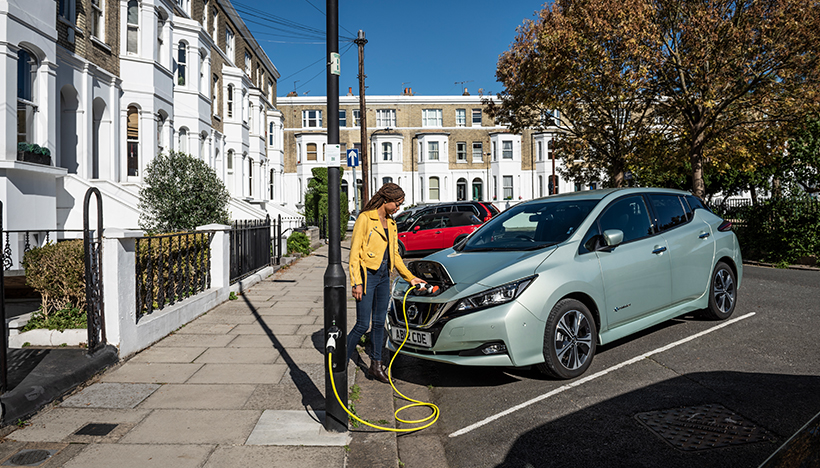
The road freight sector will be able to use battery electric power and hydrogen to get to net zero, as well as biogas, biofuels and liquefied natural gas (LNG). LNG can help to reduce greenhouse gas emissions in trucks and buses. In 2021, we added 18 LNG refuelling stations to our network, which now consists of 44 sites across Europe.
In 2022, we started construction of our bio-LNG liquefaction plant in Rheinland, Germany, which will provide bio-LNG to 4,000-5,000 LNG trucks by 2023. We also started offering bio-LNG blended with regular LNG to all our customers in the Netherlands.
We are working with partners to increase the adoption of hydrogen and electric trucks. We signed an agreement with Daimler Truck AG, for example, to encourage the adoption of hydrogen trucks in Europe. Shell aims to build 150 hydrogen refuelling stations and supply around 5,000 Mercedes-Benz heavy-duty trucks with hydrogen by 2030.
In the USA, through our subsidiary Shell Recharge Solutions, we started providing electric charging infrastructure for trucks as part of a project led by Volvo Group and South Coast Air Quality Management District.
We offer nature-based carbon credits to fleet customers in 17 countries. This enables them to offset the emissions generated by the extraction, refining, distribution and use of the Shell fuel they buy.
We support policies and incentives in the European Union (EU) that would enable all new medium- and heavy-duty vehicle sales to be zero-emissions vehicles by 2040, to help the EU to meet its 2050 carbon neutrality goal.
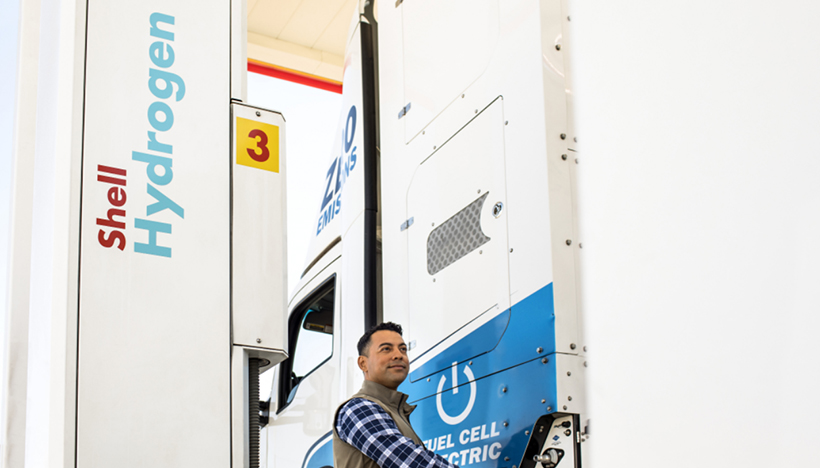
Sustainable aviation fuel (SAF) is the aviation sector’s most viable option for reducing its emissions in the short to medium term.
SAF currently accounts for less than 0.1% of the world’s consumption of aviation fuel. Currently, Shell supplies SAF made by others. From 2024, we will start supplying customers with SAF produced at our Shell Energy and Chemicals Park Rotterdam, the Netherlands. In September 2021, we announced our ambition to produce around 2 million tonnes of SAF a year by 2025 and to have at least 10% of our global aviation fuel sales as SAF by 2030.
We are working with Rolls-Royce to test 100% SAF in airplane engines for the first time. In 2022, Shell was the first company to supply SAF to customers in Singapore where we have established the supply chain, from blending to distribution, for the Asian market.
We support tax incentives to help to drive down the cost of SAF around the world. We are advocating that the EU’s 2030 target for the use of SAF doubles from 5% to 10%, and for governments and policymakers to encourage the International Civil Aviation Organization to adopt a net-zero emissions target for 2050.
The aviation sector needs verifiable, high-quality nature-based solutions (NBS) to offset emissions, and we are offering these to airline customers such as Etihad Airways. Shell also sees a potential opportunity for hydrogen in aviation and we have taken a stake in ZeroAvia, a developer of hydrogen-electric aircraft.
The marine sector, like aviation, is hard to decarbonise because of the long life cycle of vessels and high upfront investment costs. Low-carbon solutions include hydrogen and ammonia in the long term, and LNG, biofuels and methanol in the short term. We are developing an initial portfolio of biofuels for shipping, and in 2021, we performed the first bio-LNG bunkering trial in Rotterdam, the Netherlands.
We have completed more than 400 ship-to-ship LNG bunkering operations in seven countries and eight ports. In 2021, we carried out the first LNG bunkering operations in Gibraltar and Singapore. We are aiming to double the size of our LNG bunkering network by the mid-2020s, to around 15 major ports on key international trading routes. Shell is a member of a coalition that is calling for at least 5% zero-emissions fuel in international shipping by 2030, and for commercially viable zero-emissions vessels on deep-sea trade routes.
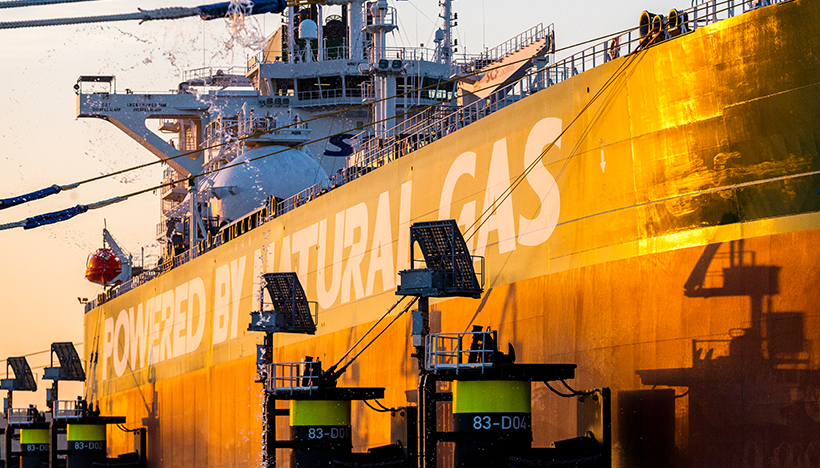
We serve customers across the industrial and commercial sectors where there is growing demand for decarbonisation products and services. More than 2,000 companies and organisations have made commitments to get to net-zero emissions by 2050. We are now forming strategic alliances with big multinational companies such as Microsoft and Amazon, helping them and us to achieve our net-zero aims.
For example, we are supplying Microsoft with renewable energy as part of our strategic alliance launched in 2020. In 2021, we advanced this partnership by signing several agreements to supply more than 500 MW of renewable energy, helping Microsoft to meet its goal of using 100% renewable energy by 2025.
The heavy industrial sector includes utilities, process industries, such as chemicals, refining and industrial gases, and heavy manufacturing industries such as steel, cement, glass, and paper and pulp.
It is challenging to decarbonise these sectors rapidly because they involve complex processes and the required technologies are not available at scale. They also tend to involve processes that require high temperatures, dense energy storage and, in many cases, chemical reactions that produce CO2 as part of the production process.
In 2021, we entered into several agreements with leading businesses to reduce emissions from heavy industry. We are exploring how hydrogen can help to reduce emissions from the steel sector, for example, in partnership with steel producers Baosteel in China and Bluescope in Australia. Together with companies such as Pan-United Corporation in Singapore, we are developing opportunities to produce low-carbon concrete products.
In industrial hubs where we have low-carbon energy and chemicals parks, including in the Netherlands and Singapore, we are working with other companies to build the infrastructure required to support the decarbonisation of several facilities at one time.
Shell's ambition is to work with governments, customers and partners to unlock the potential for carbon capture and storage (CCS) to reduce emissions where there are no currently scalable low-carbon alternatives. We seek to have access to an additional 25 million tonnes a year of CCS capacity by 2035 – equal to 25 CCS facilities the size of our Quest site in Canada.
In 2021, Shell's operating costs for and investment in CCS opportunities amounted to around $146 million. Shell’s share of captured and stored CO2 was 0.4 million tonnes in 2021. By the end of 2021, our Quest CCS operations in Canada (Shell interest 10%) had captured and safely stored more than 6.5 million tonnes of CO2 since it began operating in 2015. In Australia, the Gorgon CCS project (Shell interest 25%, operated by Chevron), which started operating in August 2019, had stored more than 5 million tonnes of CO2 by the end of 2021. Gorgon is the largest CCS operation in the world.
We have taken a final investment decision on the Northern Lights project in Norway which includes the transport and permanent storage of CO2 in a reservoir beneath the sea. The first phase of this project will provide more than 0.25 million tonnes per annum (mtpa) of CCS capacity by 2025. In total, we have two CCS projects in operation and more than 10 under development.
Shell’s CANSOLV CO2 system is one of the leading large-scale, post-combustion, carbon capture technologies in commercial operation. After capture, the CO2 is released as a pure stream that can be stored or used in other processes. In 2021 and the first quarter of 2022, Shell’s CANSOLV technology was selected for six projects with the potential to capture a combined 12 million tonnes of CO2 a year [A]. These projects are in the UK and the USA and span the refining, chemicals and power sectors.
Read more about our CCS projects at www.shell.com/ccs.
[A] This is shared as an example of how Shell is developing and using technology to capture CO2.
Carbon credits generated by high-quality nature-based projects may be used by Shell and our customers to offset emissions in line with the mitigation hierarchy of avoid, reduce and offset.
Shell is investing in the development of high-quality nature-based projects, which are independently audited for the quality and quantity of credits. In 2021, we invested $26 million in nature-based solutions, such as reforestation and the prevention of landscape degradation and destruction. We also invested $11 million in cookstove projects, which reduce the emissions from households traditionally using open fires for cooking.
In 2021, we expanded our offer of carbon credits to drivers and business customers who wish to compensate for the life-cycle CO2-equivalent emissions generated by their use of the Shell fuel they buy. We have made this offer available to our fleet customers in 17 countries and to retail customers at more than 3,100 service stations in Austria, Canada, Germany, Hungary, the Netherlands, Switzerland and the UK.
We retired around 6 million credits in 2021, which we estimate is the equivalent to 2.9 million cars being taken off the road for one year. Of these, 5.1 million credits were retired in association with the use of our energy products by our customers, with the remainder associated with the production of synthetic lubricants and emissions from Shell’s business travel.
It is important that nature-based carbon credits are of high quality. In November 2021, Shell published a report ‘Ensuring high-quality nature-based carbon credits’ that sets out our expectations and approach to quality across our portfolio of nature-based solutions.
We expect the market for high-quality credits to grow sharply during the next decade. We expect to retire around 120 million credits in 2030.







